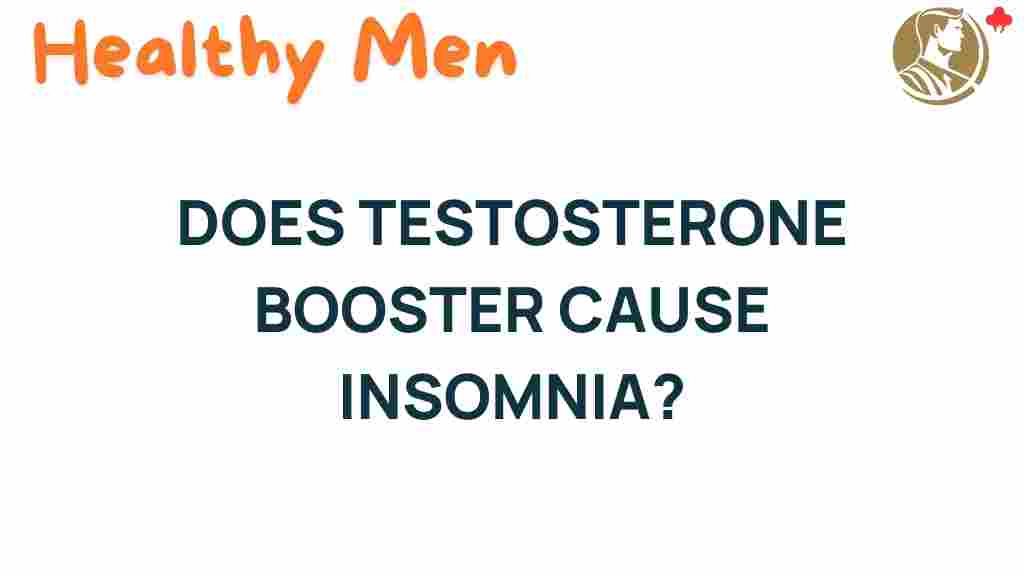The Surprising Link Between Testosterone Boosters and Insomnia
Testosterone is a vital hormone in the human body, influencing various aspects of health, including mood, energy levels, and even sleep quality. In recent years, testosterone boosters have gained popularity as a means to enhance testosterone levels, particularly among men experiencing fatigue or low energy. However, the relationship between testosterone boosters and insomnia is complex and often surprising. This article explores how testosterone, insomnia, and supplements interconnect, highlighting health risks and providing tips for improving sleep quality.
Understanding Testosterone and Its Role in the Body
Testosterone is primarily known as the male sex hormone, but it plays significant roles in both men and women. It contributes to various bodily functions, including:
- Regulating libido
- Supporting muscle mass and strength
- Maintaining bone density
- Influencing mood and cognitive function
As men age, testosterone levels naturally decline, which can lead to symptoms such as fatigue, reduced muscle mass, and decreased libido. To combat these effects, many turn to testosterone boosters, which are supplements designed to enhance the body’s natural testosterone production.
The Impact of Testosterone on Sleep Quality
Research indicates that testosterone plays a critical role in regulating sleep. Low testosterone levels have been linked to:
- Increased insomnia
- Lower sleep quality
- Higher chances of sleep apnea
Conversely, optimal testosterone levels can contribute to better sleep patterns and overall wellness. However, the introduction of testosterone supplements can complicate this relationship.
How Testosterone Boosters Affect Sleep Patterns
While testosterone boosters are marketed to enhance energy and improve overall health, they can also have unintended effects on sleep. The relationship between these supplements and insomnia can be attributed to several factors:
- Hormonal Fluctuations: Taking testosterone boosters can lead to spikes in testosterone levels, which may disrupt the body’s natural circadian rhythms.
- Stimulation of the Nervous System: Some testosterone supplements may have stimulatory effects, leading to increased heart rate and energy levels, making it difficult to wind down at night.
- Imbalances in Other Hormones: Testosterone interacts with other hormones, such as cortisol and estrogen, which can further impact sleep quality.
The Health Risks of Testosterone Supplements and Insomnia
While many individuals report positive effects from testosterone boosters, it’s essential to be aware of potential health risks, particularly concerning insomnia:
- Increased Anxiety and Restlessness: Some users may experience heightened anxiety, which can lead to difficulty falling asleep.
- Dependency on Supplements: Relying on testosterone boosters can lead to a cycle of dependency, where natural hormone production diminishes.
- Cardiovascular Risks: High testosterone levels have been associated with an increased risk of heart problems, especially in older adults.
Steps to Improve Sleep Quality While Using Testosterone Boosters
If you’re using testosterone boosters and experiencing insomnia, consider the following steps to improve your sleep quality:
- Consult a Healthcare Professional: Before starting any supplement regimen, it’s crucial to consult with a healthcare provider to assess your testosterone levels and overall health.
- Adjust Dosages: Follow the recommended dosages of testosterone boosters, as taking more than necessary can lead to negative side effects.
- Establish a Sleep Routine: Create a consistent bedtime routine that includes winding down activities, such as reading or light stretching, to signal your body that it’s time to sleep.
- Limit Stimulants: Avoid caffeine and other stimulants in the afternoon and evening, as they can interfere with sleep.
- Create a Sleep-Conducive Environment: Ensure your bedroom is dark, quiet, and cool to promote better sleep quality.
Addressing Fatigue Linked to Insomnia
Fatigue is a common complaint for those dealing with insomnia, especially when combined with low testosterone levels. Here are some strategies to combat fatigue:
- Regular Exercise: Engaging in regular physical activity can help boost energy levels and improve mood.
- Balanced Diet: A diet rich in whole foods can support overall health and hormone production.
- Mindfulness and Relaxation Techniques: Practices such as meditation and yoga can reduce stress and promote better sleep.
Troubleshooting: When to Seek Help
If you’ve tried various strategies to improve your sleep quality and still find yourself struggling, it may be time to seek professional help. Consider the following signs that indicate you should consult with a healthcare provider:
- Persistent insomnia despite lifestyle changes
- Symptoms of depression or anxiety
- Significant fatigue affecting daily activities
- Any unusual physical symptoms or changes in health
Your healthcare provider can offer tailored advice and may suggest hormone therapy or alternative treatments to address your symptoms.
The Future of Hormone Therapy and Sleep
The ongoing research into hormone therapy and its effects on sleep is promising. As our understanding of testosterone’s role in sleep quality evolves, new treatments and strategies may emerge to help those struggling with insomnia. For now, maintaining balanced testosterone levels through healthy lifestyle choices remains essential for promoting wellness and improving sleep quality.
For more information on hormone therapy and its implications, check out this resource.
Conclusion
In conclusion, the link between testosterone boosters and insomnia is multifaceted and warrants careful consideration. While testosterone plays a crucial role in regulating various bodily functions, including sleep, the introduction of supplements can lead to unintended consequences such as insomnia and fatigue. Understanding the health risks associated with testosterone boosters and implementing strategies to improve sleep quality is vital for overall wellness.
To ensure you maintain healthy testosterone levels and enhance your sleep quality, always prioritize a holistic approach that includes a balanced diet, regular exercise, and stress management techniques. If you’re struggling with insomnia, don’t hesitate to seek assistance from a healthcare professional to explore the best options for your needs.
This article is in the category Conditions and created by healthymen Team
